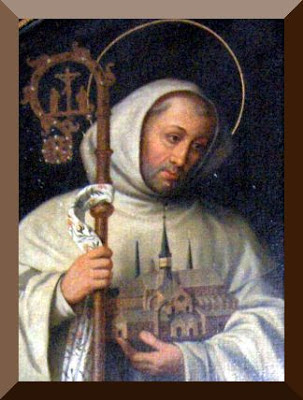Blessed Jacopone of Todi (also known as Crazy Jim; Iacopone da Todi; Jacomo da Todi; Jacopo Benedetti; Jacopo Benedicti; Jacopone Benedetti da Todi; Jacopone of Todi; James da Todi) was an Italian noble from the Benedetti family of Todi born around 1230 A.D.
He was a successful lawyer at Bologna, and he married Vanna di Guidone in 1267. Vanna considered Jacomo too worldly, and did penance for him.
In 1268, Jacomo insisted she attend a public tournament against her wishes. The stands in which she sat collapsed, and Vanna was killed. The shock of this event, and his discovery of her penance for him, caused a radical change in Jacomo. He gave his possessions to the poor, dressed in rags, and joined the Third Order of Saint Francis. His former associates called him Jacopone, Crazy Jim, a name which he embraced.
After ten years of this penance and abuse, Jacomo tried to join the Franciscans, but his reputation as Crazy Jim preceded him, and he was refused. To prove his sanity and intentions, he wrote a beautiful poem about the vanities of the world which swayed the Franciscans, and he joined the Order in 1278. He refused to be ordained, and spent time writing popular hymns in the vernacular.
Jacopone suddenly found himself a leader in a disturbing religious movement among the Franciscans. The Spirituals, as they were called, wanted a return to the strict poverty of Francis. They had the support of two cardinals and Pope Celestine V.
The two cardinals, however, opposed Celestine's successor, Pope Boniface VIII, and due to the wrangling in the Vatican, Jacopone was excommunicated and imprisoned at the age of 68. Jacopone acknowledged his error, but was not released until five years later, when Blessed Benedict XI became pope. He accepted his imprisonment as penance.
He spent his last three years giving himself completely to spirituality, weeping "because Love is not loved," and writing hymns, including the famous Latin hymn, Stabat Mater.
Blessed Jacopone of Todi died December 25, 1306 at Collazzone, Italy as a priest intoned the Gloria from midnight Mass. His relics are at Saint Fortunato Church, Montecristo, Italy.
* * * * * * *
The Stabat Mater
At the cross her station keeping,
Stood the mournful Mother weeping,
Close to Jesus to the last.
Through her heart, His sorrow sharing,
All His bitter anguish bearing,
Now at length the sword had pass'd.
Oh, how sad and sore distress'd
Was that Mother highly blest
Of the sole-begotten One!
Christ above in torment hangs;
She beneath beholds the pangs
Of her dying glorious Son.
Is there one who would not weep,
Whelm'd in miseries so deep
Christ's dear Mother to behold?
Can the human heart refrain
From partaking in her pain,
In that Mother's pain untold?
Bruis'd, derided, curs'd, defil'd,
She beheld her tender child
All with bloody scourges rent.
For the sins of His own nation,
Saw Him hang in desolation,
Till His spirit forth He sent.
O thou Mother! fount of love!
Touch my spirit from above;
Make my heart with thine accord.
Make me feel as thou hast felt;
Make my soul to glow and melt
With the love of Christ our Lord.
Holy Mother! pierce me through;
In my heart each wound renew
Of my Saviour crucified.
Let me share with thee His pain,
Who for all my sins was slain,
Who for me in torments died.
Let me mingle tears with thee,
Mourning Him who mourn'd for me,
All the days that I may live.
By the cross with thee to stay,
There with thee to weep and pray,
Is all I ask of thee to give.
Virgin of all virgins best,
Listen to my fond request
Let me share thy grief divine.
Let me, to my latest breath,
In my body bear the death
Of that dying Son of thine.
Wounded with His every wound,
Steep my soul till it hath swoon'd
In His very blood away.
Be to me, O Virgin, nigh,
Lest in flames I burn and die,
In His awful Judgment day.
Christ, when Thou shalt call me hence,
Be Thy Mother my defense,
Be Thy cross my victory.
While my body here decays,
May my soul Thy goodness praise,
Safe in Paradise with Thee.
Amen.
-- Blessed Jacopone da Todi












